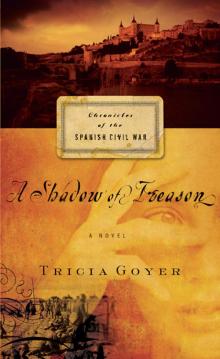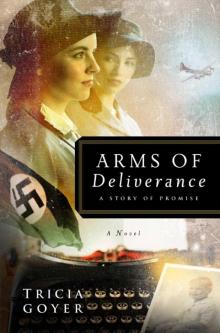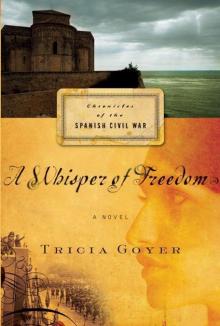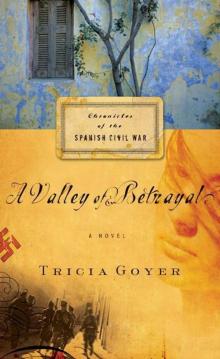- Home
- Tricia N. Goyer
Whisper of Freedom Page 21
Whisper of Freedom Read online
Page 21
She couldn't see José's face, but she could read his pause.
"I'd guess Petra. A young woman who's helped me."
Ramona felt heat course through her. "A woman? Who is she?"
He patted her hand. "Not now. I'll explain. I'll be back."
"José, no!" Her frantic cry was no more than a whisper. He didn't pause, but rushed ahead, leaving her. He was gone, disappearing into the night.
Why hadn't he told her about this sooner? Unless he has something to hide.
She clenched her hands to her chest. "He came for me. He loves me," she whispered into the night. "He loves me."
* * *
José darted from the gallery, ran twenty feet, and paused. He thought about returning to the barn, but then he heard the sound of a horse galloping and turned. There, in the light of the moon, he spotted two horses nearing. A small figure rode bareback on Erro. He waved his arms.
Petra stopped beside him. "I saw your escape. I knew it was time to get the horses." He didn't ask why she had again disobeyed his request for her to stay with the nurses. He was just glad she had.
"I didn't have time to saddle them. And Calisto . . . Michael fired a shot. I'm not sure if it hit him or not. He stumbled."
José did a quick scan over Calisto's back and chest. "He seems fine. Wait here." José went back for Ramona.
"Petra is here; she has the horses." He motioned to Erro. "You must ride with her. The two of you will weigh less."
Calisto whined and pawed the ground, but José ignored it.
"Here." He cupped his hands for Ramona to use for a step, and she climbed on the back of the horse. He looked to Petra. "Follow me. We'll stay off the roads."
She nodded and pulled Ramona's arms tighter around her waist. "Hold on," she urged.
José grabbed Calisto's mane and vaulted onto his back. He looked around briefly to gain his bearings, then headed toward the hills in the distance.
The sound of a vehicle starting broke the still night air. He whispered a silent prayer that they'd make it into the trees before the truck caught up.
The scent of smoke that still hung in the air also reminded him of the approaching Fascist troops. He hoped they hadn't already descended on the town.
"Follow me," he called again, signaling to Calisto with the slightest nudge of his heels to carry him into the night.
Chapter Twenty-Seven
The towers of the Alhambra gleamed like silver in the sky. Sophie didn't know if it was the cool breeze from the mountains or the sight of the structure that caused goose bumps to rise on her arms.
Dozens of eyes were on her as she walked toward the market from the train station where Walt had dropped her off, to give the appearance that she'd just arrived in town. She carried a floral satchel—an upgrade from the battered one that had journeyed with her all over Spain. And she wore a crisp white blouse, a simple skirt that swished as she walked, and a red scarf tied around her head in Spanish style. She smiled slightly as she remembered the look of appreciation in Philip's gaze as he saw her all dressed up. But she'd noted something else, too. Fear, concern. His fingers had clung to her as she held his hand as they said good-bye.
It seemed everywhere she looked it was business as usual. Bread, potatoes, and hotel rooms seemed plentiful. And everyone she met praised General Franco. From the conversations she picked up on, Franco was a military genius and universally beloved.
She walked along a cobbled street. It was her first time in Granada, but the surroundings were so similar to other parts of Spain that it seemed she'd been there a hundred times.
Sophie adjusted her flannel skirt—too thin, too long, too big for her waist, but it looked similar to those of the other women who strolled along the street.
The small café had few visitors, mainly because it was still early morning, and most people didn't rise before ten o'clock. A cat walked toward her, twisting its thin form around the legs of the iron chairs. It met Sophie's legs and did the same. She didn't slow her pace and gently pushed the cat to the side with her new shoe-clad foot. She thought of Badger and hoped he was all right.
Her skirt swished, and Sophie added an extra sway to her hips. She had a part to play, after all.
"Eleanor," a voice called out, and she paused. She turned and saw a tall man who looked strikingly similar to Salvador.
"Uncle Tomas!" She opened her arms to him, noticing the gazes of the few sellers in the market.
He embraced her and quickly kissed her cheeks. "Sorry I missed your arrival. I unfortunately slept in."
She took a step back and forced a smile on her face. "It is fine. I am well. Thank you for inviting me. I'm eager to see Alhambra."
Sophie relaxed, realizing how easy it was to play this part.
"Quipotest capere capiat. He who is able to receive it, let him receive it." He waved a hand toward a waiting car. "I am glad you accepted my invitation."
Ritter searched through five bookshops until he found what he sought. He bought the aged volume and hurried back to his apartment. After getting comfortable in his favorite chair, he brushed off the dusty book and read the title again. Inca Gold.
He told himself he needed something to keep his mind occupied. He didn't want to think about Isanna or Sebastian. He didn't want to face Monica, embarrassed by the way he'd wept in her arms. And so his thoughts turned to the treasure. It didn't even matter that it was only a story. It was an interesting story and something he could pour himself into.
He flipped through the pages, reading the personal accounts of men who'd traveled to South America. Some claimed they'd journeyed there to search for the remnants of primitive civilizations and native Indian tribes. Others longed to carry the grace of Christianity to heathen souls, ministering among the tribes. And all returned with stories of treasure.
As Ritter read, he was transported to the land of vivid sunlight, warm adobe houses, and stories from old women who seemed as ancient as the hills themselves. So many of the descriptions reminded him of sunny Spain, and a strange beckoning to return stirred within him.
He read, occasionally glancing at his pocket watch. Ritter was eager for his meeting with Göring. Göring had been thrilled when he'd delivered the satchel days ago, but Ritter hadn't heard anything since.
At first he wondered if the general had somehow found out he'd read the documents in the satchel, but when he'd spotted him at a social event and Göring offered a friendly wave, Ritter knew that wasn't the case.
Ritter hoped Göring would propose another visit to Spain. Ritter was eager to see what else the general was up to. And he hoped additional information needed to pass hands.
The shiny automobile carried Sophie up the road to what Tomas called the southern entrance. Lofty elms and chestnut trees lined the roadway, leading them to the horseshoe-shaped arch through which they entered. The automobile continued on, and she peered over cisterns cut into the rock.
"This is called the Place of Cisterns. Although the plateau has its own aqueduct, there was always a danger in times past of enemy troops cutting off the water," Tomas explained. The cadence of his speech also reminded her of Salvador; she was certain they were brothers, maybe twins. Of course, she wasn't given that information. The guerilla fighters had told her the less she knew, the better.
Because if I'm found out and tortured, I'll have nothing to disclose.
As the vehicle continued on, Sophie felt as if she was not only being transported someplace magical, but through a portal of time as well.
After they parked, the driver opened the door for her. She stepped from the car and took in a breath at the kaleidoscope of shimmering beauty surrounding her.
"This, my dear, is the last bastion of the Islamic presence in what used to be known as Iberia. Depending on the angle of the sun's rays, you will notice the walls of the Alhambra will change shades of red. The red is due to the bricks made from the richly colored mud."
"It's lovely," Sophie whispered. "And larger than I imagined.
Larger than it looks from below."
Tomas took the satchel from her and offered his arm. Sophie gladly slid her hand into the crook of his elbow.
"The Alhambra itself is divided into three sections, although they appear as one," he continued. "The public esplanade is the first. The sultan's official residence is the second. The courtyard is part of this, and it leads to the loftiest tower—the Comares Tower, which rises 150 feet into the air."
Tomas pointed to the tower, which cast a shadow upon them. "There are only two windows in the tower, and they light the Hall of the Ambassadors, where—when seated on his throne—the sultan would receive his envoys."
"And the third part?"
"The housing for the harem. While the prophet Muhammad restricted each follower to only four wives, two loopholes made it possible for the wealthy or powerful to enjoy the favors of regiments of women."
Her surprise must have shown on Sophie's face.
Tomas chuckled. "Do not worry. This place has become Christianized since then. And Franco himself is an ambassador for Christ, remember? You will be staying in the Renaissance Palace—added by Charles V, the Holy Roman Emperor."
From her place upon the high hill, she looked upon Granada below. The white houses and buildings with red-tiled roofs sparkled in contrast to the green of the hillsides around it.
"This view. It is like—"
"An oriental pearl in an emerald setting?"
She quickly glanced up at him, sucking in a breath. "Exactly."
Tomas laughed. "Don't credit me. I'm simply quoting an Arab poet from long ago."
He walked her to the northern side where a large gorge opened to a river below. "The Darro River. An impregnable defense. Come. We will enter through the Gate of Justice."
A shiver traveled up Sophie's arms at the name. Maybe I will find justice within these walls. At least it was her hope.
Tomas led her to a large door. "The Alhambra from the outside is impressive but not unique. Just as Muslim women hide their beauty beneath shapeless cloth, so the Eastern homes and palaces hide beauty within. Outside, there is nothing to envy—no treasures to be stolen or defaced. But inside . . ." Tomas opened the door and led her in. "Inside is a different story."
They walked through long halls, and Sophie almost forgot to breathe as she took in the intricate design and architecture. She paused before an archway that had to be the most beautiful masterpiece she'd ever seen. It was something she imagined from the story Arabian Nights that she'd read as a child. She wanted to run her fingers along the floral motifs and geometric designs, but she held back, reminding herself she was supposed to be a woman of culture who was used to fine things.
They continued on, and her eyes widened at the countless ornamental reliefs and mosaics. Each room seemed to top the last in beauty and intricacy of design.
"You will note some parts of the castle are still in disrepair. For many years this place was abandoned and used as the hideout of bandits and thieves." Tomas's eyes sparkled. "But there is more than enough repaired to enjoy . . . to paint."
Men and women moved about—mainly servants working at various tasks. None of them offered Sophie more than a glance, and she prided herself on the fact that she fit in well.
"Feel free to wander as you like," Tomas said. "I know as an artist there is much that will interest you." They walked to what she assumed was the palace, and he led her to a door on the first floor. He opened the door with a grin, and she entered the large suite and stopped short in delight and surprise. The windows of the room overlooked the town of Granada. An easel had been set up before it. A side table was filled with various painting supplies.
"You've come to paint, have you not, Eleanor?" Tomas asked with a twinkle in his eyes. "You can be assured my friends will ask for regular updates. You better not disappoint."
Sophie rushed forward and picked up a paintbrush, marveling at the feel of it in her hand. She turned and then offered Tomas a quick hug. "Thank you. I will begin today."
An hour into her first canvas, Sophie adjusted her weight from side to side as she studied it. Considering she hadn't painted in months and months, she did a fine job of painting the view from the window. But something didn't seem right. Though her specialty used to be landscapes, they now seemed boring and . . . uninteresting.
She considered taking her easel to the courtyard. Out there, she would no doubt have chances to meet many of the castle's visitors—which was one of her objectives. Instead, a strange burden weighed on her shoulders, and she had an image of the one painting she most desired to capture.
Sophie rearranged her supplies and set up a new canvas. She began with the face of the woman in the cave apartment. Then she painted Deion, disguising him as a Moor. His mouth was open as she remembered the memory of him singing gospel songs while lying in a hospital bed at the first-aid station where she'd helped.
She smiled to herself as she painted the uniform, realizing he'd be horrified to see himself as such . . . but it warmed her heart to shape his face upon the canvas. Sophie painted José next. And then Benita and Father Manuel. She disguised each one so she alone knew their true identity.
With each brushstroke she realized how these people—once strangers—had affected her. At the beginning of the war, it had been easier for her to think of the "big picture"—she had focused on the victory of a nation. But the more she experienced the war, the more she realized its unique effect on individual people. It wasn't a nation that hurt—it was the hearts of millions, one by one.
Painting the hands, the feet—each unique—Sophie also realized God hadn't given her a way of escape from Spain. He'd instead planned for her to be where she was—serving and being served.
"To live or die, it's not up to me, but to serve God. To do my best to help the one He brings before me. That is enough," she prayed as she painted.
The light outside the window faded, and Sophie realized that dinner had passed, and she had missed it. Her stomach rumbled, but her heart felt full.
And by the time she heard footsteps approaching from outside her door, Sophie realized one thing. In the long run it didn't matter much if the gold made it out or not. It didn't even matter if she made it out. If, in the end, when she approached the throne of Christ, He said, "Well done, good and faithful servant . . . for each small act of obedience and way of tenderness," then that would be enough. It would be her true reward.
With a sigh, she finished and laid down her paintbrush, gazing at the faces of her friends. Even in heartache, there were those who had hope and faith. And even if the victories on this earth could not be achieved by those who she thought deserved it, God could still be victorious in hearts and souls.
"God can win here, in the center of our hearts. We may die, yet we will live," she whispered. "We can lose, yet no one can take away what we carry in our hearts. And that is where true victory lies—in the whispers of deep recesses. Whispers that no one else can hear. A place where we and our Savior meet alone."
A knocked sounded at the door, and she turned and smiled as she strode to the door. Tomas was waiting. With him were two men with a large trunk.
"It is a sad thing, Eleanor, that you lost your luggage during your travels. What a dreadful thing to try to cross a country in the midst of war. A friend of mine heard of your plight and offered you a few things. There is a formal dinner tomorrow night, and I hope you can find something to wear."
He motioned to the men, and they placed the trunk in the room. The two servants left, but Tomas stayed, eyes eager to see her response. Sophie opened the trunk and saw everyday dresses on top. She lifted them out; beneath lay two Spanish-style gowns.
Sophie sucked in her breath and lifted a light blue one. She pressed it to her chest and did a slow twirl. Then her painting caught her attention, and she remembered why she was here. She remembered her prayer from only a moment before . . . amazed that in the midst of all that had happened and all that might happen, God had given her this unexpected
gift, even if only momentarily—the freedom to paint gorgeous, lush surroundings and ancient craftsmanship. He'd even given her beautiful gowns. She smiled as once again she came face-to-face with the providence of God.
Tomas followed her gaze to the painting. "Amazing. I never knew my niece was so talented." He walked toward the painting. "I cannot believe you have created a masterpiece in such a short amount of time. Do you know these people?"
Sophie laid the dress upon her bed, amazed how Tomas always stayed in character. He never dropped his guard, never wavered. "Just faces I've seen on my travels, Uncle—composites of those who fight so hard for Generalissimo Franco."
Tomas nodded his approval; then he offered her another hug before leaving. "Good night, Eleanor. I'll have a tray of food sent up for you. And sweet dreams. I look forward to hearing about the great things you'll discover around these grounds mañana."
Chapter Twenty-Eight
José only considered stopping when he was certain they were far enough in the hills that Michael could not reach them by vehicle or foot. The sun now crested over the horizon, and it was strange to see Petra and Ramona riding together—two parts of his life intersecting. He hoped that the two women he cared for would become friends.
The sound of a creek met his ears, and he remembered this place from his journey down the mountain—a small place of refuge among the hills.
"Petra, stop in that clearing ahead," he called to her. "We will rest the horses . . . and ourselves."
"Yes, José," Petra called over her shoulder. She turned and looked back, and it was from the wild look in her eyes that he knew something was desperately wrong.
"What is it, Petra?"
"José! Calisto is bleeding!" The color drained from her face.
José quickly dismounted and saw the bright red stream of blood on Calisto's shoulder. Yet the horse had carried him to safety, and his steps hadn't wavered. Guilt washed over him for not stopping sooner to check the horse.

 Shadow of Treason
Shadow of Treason Arms of Deliverance
Arms of Deliverance Whisper of Freedom
Whisper of Freedom Dawn of a Thousand Nights
Dawn of a Thousand Nights Valley of Betrayal
Valley of Betrayal